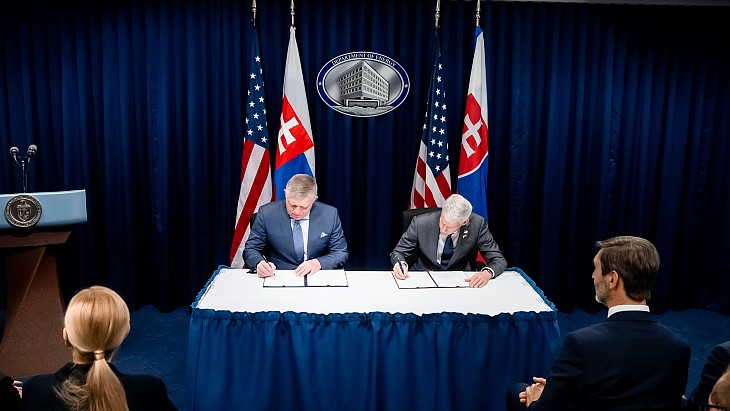The International Atomic Energy Agency (IAEA) said its experts at the Zaporizhzhia plant "witnessed thick dark smoke coming from the north-western area of the plant, after hearing multiple explosions throughout the evening".
The IAEA team heard an explosion at the same time the plant informed them that a drone had allegedly struck one of the plant's two cooling towers.
"In order to ascertain the extent and possible cause of this event, the IAEA Support and Assistance Mission to Zaporizhzhia is requesting immediate access to the cooling tower to assess the damage," the Agency said.
The Zaporizhzhia plant has two cooling towers located at the northern side of the cooling pond, outside of the plant perimeter. Cooling towers are used during power operation of the plant. All six reactors at the plant are currently in cold shutdown.
The IAEA noted that damage to the cooling tower therefore "does not directly impact the safety of the six units in shutdown".
Russia, which has occupied the plant since March 2022, said the fire had been started by a Ukrainian drone attack. However, Ukrainian President Volodymyr Zelenskyy accused Russia of lighting the fire.
IAEA Director General Rafael Mariano Grossi reiterated that any military action taken against the plant represents a clear violation of the five concrete principles for protecting the facility, which were established at the United Nations Security Council in May last year.
"These reckless attacks endanger nuclear safety at the plant and increase the risk of a nuclear accident. They must stop now," he said.
Ukrainians approach Kursk plant
Meanwhile, on 9 August, the IAEA said it was monitoring the situation after Ukrainian forces advanced 30 kilometres into Russia's Kursk region, bordering Ukraine. They reportedly advanced within 50 kilometres of the Kursk nuclear power plant.
"In view of the reportedly significant military activity, I wish to remind all parties of the seven indispensable pillars for ensuring nuclear safety and security during an armed conflict," Grossi said in a statement. "Additionally, I emphasise the five concrete principles to help to ensure nuclear safety and security which have been established for the Zaporizhzhia plant in the context of the current conflict between the Russian Federation and Ukraine, and which are equally applicable in this situation.
"These include, among others, the imperative to ensure the physical integrity of a nuclear power plant. This is valid irrespective of where a nuclear power plant is situated."
Grossi called on both sides to "exercise maximum restraint in order to avoid a nuclear accident with the potential for serious radiological consequences".
Russian state nuclear coporation Rosatom said its Director General, Alexey Likhachev, had a telephone conversation with Grossi on the evening of 9 August. "During the conversation, Alexey Likhachev emphasized that the actions of the Ukrainian armed forces pose a direct threat not only to the Kursk NPP, but also to the development of the entire global nuclear energy sector," Rosatom said.
The company said the situation "has become much more complicated in recent days", noting that on 8 August fragments and pieces of downed missiles were found on the territory of the nuclear power plant, including in the area of the radioactive waste processing complex.
"The actions of the Kyiv regime on the evening of 9 August disabled a transformer substation, which left the city of Kurchatov, the closest to the Kursk NPP, without electricity," it added.
Rosatom subsidiary Atomstroyexport (ASE) has reportedly reduced the number of workers at the construction site of the Kursk II plant.
"Due to the imposition of a federal-level state of emergency in the region, a decision has been made to temporarily reduce the number of personnel at the construction site of Kursk II NPP generating units," ASE was quoted as saying by Interfax. "The specialists remaining at the construction site are working on schedule. All systems supporting the progress of the generating units' construction are operating normally."

.jpg)



_19544_40999.jpg)

_66668.jpg)






